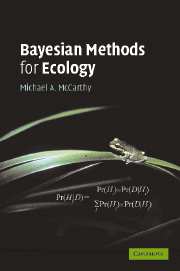Preface
Published online by Cambridge University Press: 05 June 2012
Summary
I have three vivid memories about learning statistics as an undergraduate that all involve misconceptions. Firstly, I remember my lecturer telling me that, after obtaining a result that was not statistically significant, I should conclude that timber harvesting did not have an effect (on what, I cannot remember). While the logic was flawed, I have since realized that it is a misconception shared by many ecologists.
My second memory is of reading about Bayesian analyses in journal articles. I wondered what Bayesian methods were, how they differed from the statistical approaches I had been taught (frequentist methods such as null hypothesis testing and construction of confidence intervals), and why I had never heard of them before. On reading the articles, I concluded that Bayesian methods must be hard to do. It turns out that I was incorrect again.
My third memory is that statistics was boring. I was wrong again. I was reasonably good at the mathematics involved, but it was not until I started doing my own data analyses during my Ph.D. that I saw the benefits of using statistics. I began to learn about different ways to do statistics (e.g. likelihood-based methods), and also re-learnt some old topics (e.g. realizing the importance of and learning how to calculate statistical power). For me, statistics and probability continue to be a world of learning.
- Type
- Chapter
- Information
- Bayesian Methods for Ecology , pp. xi - xivPublisher: Cambridge University PressPrint publication year: 2007



